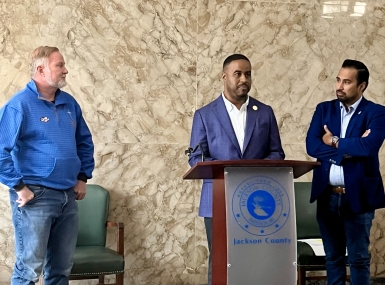Leadership Edge: Keep Your Ethics Fresh
Author
Upcoming Events
Related News
Indirect benefits to elected officials are still conflicts of interest
When the FBI arrived at my home, little did I realize that my long, public career was about to be over, and I would be sentenced to 42 months in federal prison.
I was a Palm Beach County commissioner for 18 years and an elected city official before that. It all came to an abrupt end in 2009, when I was charged by federal prosecutors with one count of Honest Services Fraud. I pleaded guilty.
To Learn More
Please join us at the workshop, Leadership Ethics: Keeping Faith in Local Government, Sunday, July 24, 9 a.m. at NACo’s Annual Conference in Los Angeles County.
In June of 2010, the U.S. Supreme Court changed the criteria for Honest Services Fraud to crimes involving bribery and extortion — neither of which I was charged with. However, during my experience with the federal justice system, I learned that what one might consider a minor ethical lapse can easily be turned into a federal crime.
One such example is “indirect benefit.” Throughout my career, the standard espoused by attorneys was that to have a conflict of interests meant you were going to “benefit” from the vote. If there was any benefit, you are required to disclose the conflict and not vote on the issue.
In my case, my husband worked for Raymond James, a firm that did business with an agency of the county. Each commissioner made one appointment to the agency, but the agency was independent, making its own decisions on whom to do business with. No county money was involved. The County Commission had to approve those business decisions on its agenda. The votes were always perfunctory.
I took the extra step to ask for an opinion from the State Ethics Commission. In their letter, they responded that if my husband benefited, I should not vote on the issue. Since they were not broader in their answer, saying instead that anytime Raymond James had an issue before the commission, I should abstain, I looked specifically at my husband’s income as I interpreted the opinion.
Since all of the employees at my husband’s firm worked on commission and anyone that did business with the county agency received the commission and not my husband, I believed it was my duty to vote on those agenda items. This approach went on for about two years, until my husband changed firms.
Ten years later, one of the issues federal investigators found was that I should not have voted on those agency matters because there was an indirect benefit to me.
I had never heard of the term “indirect benefit.” The federal prosecutor explained that any time my husband’s firm received this agency’s business, even though he was not compensated, it served to make the company more successful and viable. That, in turn, made the “lights stay on,” which was a benefit to my husband and therefore, me.
This interpretation had never occurred to me. I looked at the direct benefit of what would go into my family’s pocket and did not look for any broader interpretation.
The longer one serves in office, I believe there is a tendency to take a narrower view of ethics laws. Rationalization can become the norm and start someone down a slippery slope. I was convinced I was not committing any crime.
There are more than 4,500 federal laws and more than 350,000 federal regulations, most with criminal penalties — ignorance of the law is not a defense.
My advice to all public officials is to look at each statute, law and regulation as it pertains to conflict of interests and disclosure, as broadly as possible, and always err on the side of the broadest interpretation.
You owe it to yourself and the public you serve.
Attachments
Related News

Jackson County chair combines diverse experiences for effective leadership
A fellowship funded by the Congressional Black Caucus kick-started DaRon McGee’s career in public service, but his promise to his mother brought him back to Jackson County, Mo., where he's made his name.

Accepting criticism can help improve results, Howard County executive says
Calvin Ball recognizes that any election results show elected officials probably don’t have universal approval, and winning over critics can lead to better overall communication with all residents.
